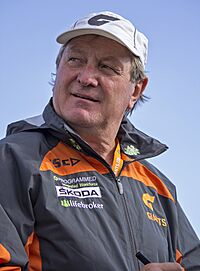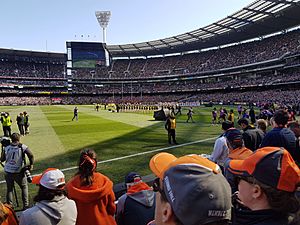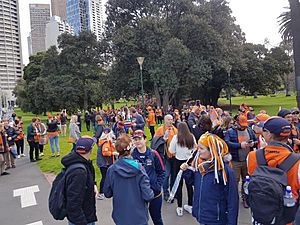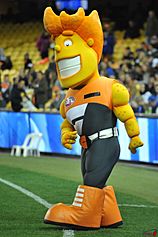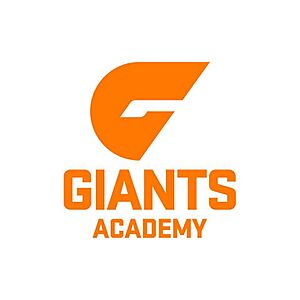Greater Western Sydney Giants facts for kids
Quick facts for kids Greater Western Sydney Giants |
||||
|---|---|---|---|---|
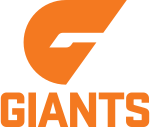 |
||||
| Names | ||||
| Full name | Western Sydney Football Club Limited, trading as Greater Western Sydney Football Club | |||
| Nickname(s) | Giants, GWS, Orange Team | |||
| 2024 season | ||||
| After finals | AFL: 5th VFL: N/A |
|||
| Home-and-away season | AFL: 4th VFL: 14th |
|||
| Leading goalkicker | AFL: Jesse Hogan (77 goals) VFL: |
|||
| Club details | ||||
| Founded | 2010 (14 years ago) | |||
| Colours | Orange Charcoal White | |||
| Competition | AFL: Senior men AFLW: Senior women VFL: Reserves men VFLW: Reserves women |
|||
| President | Tim Reed | |||
| CEO | David Matthews | |||
| Coach | AFL: Adam Kingsley AFLW: Cameron Bernasconi VFL: Wayne Cripps |
|||
| Captain(s) | AFL: Toby Greene AFLW: Rebecca Beeson VFL: Ryan Hebron |
|||
| Premierships | AFL (0) NEAFL (1)
|
|||
| Ground(s) | AFL: Engie Stadium (23,500) & Manuka Oval (16,000) AFLW/VFL: Blacktown Oval (10,000) |
|||
| Former ground(s) | Blacktown Oval (2010–2013) Stadium Australia (2012–2013) |
|||
| Training ground(s) | WestConnex Centre & Tom Wills Oval | |||
| Uniforms | ||||
|
||||
| Other information | ||||
| Official website | gwsgiants.com.au | |||
The Greater Western Sydney Giants (often called the GWS Giants or just Giants) are a professional Australian rules football club. They are based in Sydney Olympic Park and represent the Greater Western Sydney area of New South Wales.
The Giants play in the Australian Football League (AFL). They joined the league in 2012 as the 18th team. The club trains at the WestConnex Centre in Olympic Park. Most of their home games are played at Sydney Showground Stadium, also in Olympic Park. They also play four home games each season at Manuka Oval in Canberra.
The Giants started playing in the AFL in March 2012. They had a tough start, finishing last in their first two seasons. However, they made it to the finals for the first time in 2016. In 2019, they reached their first ever AFL Grand Final, but lost to Richmond. As of 2024, the club has made it to the finals seven times. Each time, they have reached at least the semi-final stage.
The Giants also have other teams. They have a team in the AFL Women's league since 2017. Their reserves team has played in the Victorian Football League (VFL) since 2021. The Greater Western Sydney Giants Academy helps develop young players. They also have a netball team called Giants Netball in the Suncorp Super Netball league.
Contents
Club History
Starting the Team
The idea for an AFL team in Western Sydney began in 1999. The AFL wanted to expand the sport in the area. After the Sydney Swans played in the Grand Final in 2005, interest grew. In 2006, the AFL started a program to find and train young players in Western Sydney. This area had many people but few professional Australian Footballers.
The AFL gained support from the NSW Premier and partnered with a sports facility in Rooty Hill, New South Wales. This facility, Blacktown International Sportspark, became the new home base for the team. In 2008, the AFL officially registered the name Western Sydney Football Club Ltd.
Building the Team
In March 2008, the AFL's clubs agreed to create an 18th team in Western Sydney. The AFL also planned to upgrade a stadium at the Sydney Showground. This would become a special AFL stadium.
Kevin Sheedy became the first coach in November 2009. He signed a three-year contract. His role started in February 2010. Mark Williams, a former premiership coach, was his first senior assistant.
In November 2010, Skoda Australia became the team's first major sponsor. They sponsored the team's home ground. Other sponsors like SpotJobs, Virgin Australia, Toyo Tyres, and St. George bank joined later. Puma became their clothing partner.
In October 2012, Leon Cameron joined as a senior assistant coach. He later became the Senior Coach and led the team for nine years.
Setting Up in Western Sydney
In 2007, the NSW government and other groups invested $27.5 million to build an AFL/Cricket center at Blacktown International Sportspark. This facility included a main oval similar in size to the Melbourne Cricket Ground, a second oval, a grandstand, and indoor practice areas. It officially opened in August 2009.
The Giants played their first and only regular AFL game at Blacktown International Sportspark in April 2012. In April 2013, the team moved to Sydney Olympic Park. The NSW Government spent an extra $45 million to upgrade the Sydney Showground Stadium, which became the Giants' new home.
Recruiting Players
The Giants received special help to recruit players when they started. They could sign young players and also experienced players from other AFL clubs. This helped them build a strong team quickly.
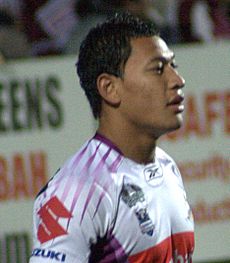
In August 2011, Phil Davis from Adelaide became the first player to sign with the new club. Other important players like Callan Ward, Sam Reid, Rhys Palmer, and Tom Scully also joined.
Some retired players, like James McDonald, Luke Power, Dean Brogan, and Chad Cornes, came back to play for the Giants in 2012. McDonald and Power also worked as assistant coaches.
The Giants also recruited Israel Folau, a famous rugby player. He joined the team to help promote Australian rules football in Western Sydney.
Early Seasons (2012-2015)
The Giants played in junior leagues before joining the AFL. Their first AFL game was on March 24, 2012, against the Sydney Swans. They lost this game. On May 12, 2012, they won their first game against the Gold Coast Suns. They only won one more game that season. They had many big losses, including five by over 100 points.
In their second season, the Giants struggled even more. They lost their first seventeen games. They finally won one game against Melbourne in Round 19. At the end of 2013, coach Kevin Sheedy stepped down. Leon Cameron took over as head coach. Sheedy joined the club's board.
In their third season, the Giants started well, winning two of their first three games. This included a win against the Sydney Swans. They finished 16th, avoiding the last place for the first time.
The 2015 season was more successful. They finished 11th with 11 wins and 11 losses. They even beat Hawthorn, who later won the premiership.
Reaching Finals (2016-2019)
The Giants' fifth season was their best yet. They won more games than they lost (16 wins, 6 losses) and made it to their first finals series. They finished 4th on the ladder. A big moment was their 75-point win over Hawthorn. They also had their largest average home crowd.
In their first final, they played the Sydney Swans at Stadium Australia. The Giants won by 36 points. Two weeks later, they faced the Western Bulldogs in the preliminary final. It was a very close game, but the Bulldogs won by six points.
In 2017, many expected the Giants to do well. Despite many injuries, they managed to finish in the Top 4. They lost in the preliminary final again, this time to Richmond.
The 2018 season was mixed. They finished seventh. They won their elimination final against Sydney but lost to Collingwood in the semi-final.
In 2019, the Giants made it to their fourth straight finals series, finishing sixth. Co-captain Callan Ward was injured early in the season. Jeremy Cameron became the first Giants player to win the Coleman Medal for kicking the most goals (67) in the home-and-away season.
The Giants surprised many by reaching their first ever Grand Final. They beat the Western Bulldogs, Brisbane, and Collingwood in thrilling finals matches. They became only the second team since 2000 to reach the Grand Final from outside the top four. In the Grand Final, they played Richmond and lost by 89 points.
Recent Seasons (2020-2024)
The 2020 season was a disappointment for the Giants. They finished tenth and missed the finals for the first time since 2015.
In 2021, star player Jeremy Cameron moved to Geelong. The Giants also changed their jersey designs. They had many injuries early in the season. Despite this, they managed to make the finals again, finishing seventh. They beat Sydney in a thrilling elimination final by one point. Their season ended the next week with a loss to Geelong.
The 2022 season was difficult. They won only 6 games and finished 16th. Coach Leon Cameron stepped down during the season. Mark McVeigh was interim coach, and Adam Kingsley was named the new senior coach in August 2022.
In 2023, under new coach Adam Kingsley, the Giants had an amazing year. They started slowly but finished strong, making the finals in seventh place. They won their elimination and semi-final games. Their great run ended in the preliminary final, where they lost to Collingwood by just one point. Kingsley was named the AFL Coaches Association Senior Coach of the Year.
The 2024 season was solid but ended in disappointment. They started with five wins and finished the regular season in fourth place, earning a double chance in the finals. Jesse Hogan won the Coleman Medal for kicking 69 goals. However, the Giants lost both their finals matches, despite having big leads in both games. At an end-of-season event, some players faced consequences for breaking team rules.
Club Identity
Name and Nickname
On November 16, 2010, the club announced their nickname: the "Giants." They often write it in capital letters, GIANTS.
After a commentator called them "the orange team" in 2022, many fans started using this nickname jokingly. The GWS Giants' official TikTok page even uses "Orange Team" in their bio.
Colors and Guernsey
The team's colors are orange, charcoal (dark grey), and white. They have different jersey designs for home and away games. The home jersey is mostly orange with a charcoal "G" symbol. The away jersey is white with a charcoal "G". Their shorts are charcoal, and socks are orange.
Since 2021, Puma has made the club's uniforms.
Mascot and Song
The team's motto is "Think Big. Live Big. Play Big." Their mascot is G-Man, who was introduced in February 2012. The AFLW team has a mascot named Gigi, unveiled in 2018.
The club song is "There's a Big Big Sound." It was written by Harry Angus from the band The Cat Empire. The song became very popular in 2019 when the Giants reached the Grand Final. Fans sometimes call the club "The Big Big Sound."
Rivalries
Sydney Swans
The Giants have a big rivalry with the Sydney Swans, called the Sydney Derby or "Battle of the Bridge." They play each other twice every season. The best player in each derby game wins the Brett Kirk Medal.
At first, the Swans usually won these games. But in recent years, the Giants have become much more competitive. The Giants have played the Swans three times in finals matches, winning every time.
Western Bulldogs
The Giants also have a strong rivalry with the Western Bulldogs. This rivalry became intense during the 2016 finals series. In the preliminary final, both teams fought hard for a spot in the Grand Final. The Bulldogs won by six points in a very close game.
Since then, their games have often been heated. In 2019, the Giants beat the Bulldogs by a large margin in a finals game. These matches often involve lots of physical play and strong competition.
Club Operations
Governance
The club is owned by the AFL Commission. The Commission chooses seven of the nine board members, and club members choose the other two.
Membership and Attendance
The Giants have grown their fan base since they started. Their membership numbers have steadily increased over the years. In 2024, they had their highest membership total with 36,629 members. Their average home crowd attendance has also grown, showing increasing support.
Training and Home Grounds
The Giants' main training facility and offices are called the WestConnex Centre and Tom Wills Oval. They are located at Sydney Olympic Park. The main oval is named after Tom Wills, an important figure in Australian football history.
The Giants play most of their home games at Sydney Showground Stadium (also known as Engie Stadium). They also play four home games each season at Manuka Oval in Canberra. This is part of a 10-year deal with the ACT Government. A special Canberra logo is on their jersey for these games.
AFL Women's Team
In April 2016, the Giants decided to create a team for the new AFL Women's league. They were chosen as one of the eight founding clubs in June.
Tim Schmidt was the first head coach. The team signed important players like Renee Forth and Emma Swanson. They also got to sign more players before the draft because of the talent in NSW/ACT. In the first draft, they picked Nicola Barr.
In July 2017, Alan McConnell became the new coach. Amanda Farrugia was the captain in 2018, with Alicia Eva as vice-captain.
Reserves Team
The Greater Western Sydney Giants also had a reserves team. This team played in the North East Australian Football League (NEAFL) from 2012 to 2019. The senior team played in the NEAFL in 2011 before joining the AFL. When the NEAFL ended in 2020, the Giants reserves team joined the Victorian Football League (VFL) in 2021.
The reserves team did not have a captain until Ryan Hebron was appointed in 2022.
Giants Academy
The Greater Western Sydney Giants Academy helps develop young football players. It was started in 2010. The Academy has many staff and facilities across different regions, including Blacktown, Canberra, Wagga Wagga, Albury, and Broken Hill.
The Academy trains hundreds of young players from age 13 upwards. Their U16 and U18 teams compete in national championships. The Giants Academy also joined the Talent League in 2019.
Community Involvement
Same Sex Marriage
During the Australian Marriage Law Postal Survey, the Greater Western Sydney Giants supported the "Yes" vote.
Voice to Parliament
The Greater Western Sydney Giants supported the Voice to Parliament.
See also
 In Spanish: Greater Western Sydney Football Club para niños
In Spanish: Greater Western Sydney Football Club para niños


